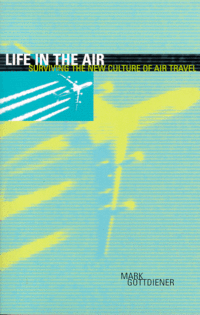

![]()
![]()

This is not to say that the book is already dated. Even after the temporary grounding of Swissair, the bankruptcy of Sabena and mounting financial troubles for major airlines, executives grit their teeth and insist that it is still business as usual – well, er, almost. In a compact way, the book dips into most sociological aspects of air travel, and it even includes a "self-help" section offering advice to readers struggling with fear of flying, jetlags and other afflictions associated with this mode of transport, which to millions of people became a "simple fact of life" in the late 20th century.
The book consists of five main parts divided into 37 short chapters, dealing with everything from the airport as a shopping mall, eroticism and boredom, the airport sign system, dehydration (!), bi-coastalism, risks and consumer discontent. It blends crude facts (mostly numbers, many of them huge) and interpretations in an attractive and thought-provoking way, although the book is neither philosophically profound nor based on painstaking empirical research. Some deep issues of air travel, such as the disorienting effects of deterritorialisation and life in the sterile limbolands of airports, are treated lightly; and the book is almost shockingly provincial from the point of view of a European readership, as it contains little about air travel outside the USA. To many non-Americans, the cultural shocks associated with fast and frictionless travelling between countries are among the most puzzling and challenging aspects of flying. The role of air travel in core societal issues such as migration and cultural globalisation is neglected, probably because these issues are less visible in the USA than in the rest of the world. Disappointingly (again, to a non-US readership), when Gottdiener writes about time/space compression in part 4, he concentrates on "bi- coastalism". A large proportion of the examples, moreover, are taken from the author's own experiences and those of his friends. He also draws liberally from all kinds of sources, from comedians and newspapers to surveys and novels.
Many of Gottdiener's stories from his and others' "life in the air" are memorable, if only because readers who are also seasoned flyers have similar stories to tell. In this way, his book contributes to nothing less than the creation of an imagined community of flyers. Take, for example, the excruciating wait caused by accumulating delays in Chicago during the major snowstorm in January 1999. He describes the impatience, frustration, hope and despair, and the social chaos caused by the collective uncertainty in an evocative way worthy of a novelist. (My own parallel stories are from Georgetown, Guyana and Lahore, Pakistan, but their structure is identical.) His stories about food, baggage retrieval systems, frequent flyers, flight etiquette (not to mention airport etiquette) and many other issues make up for the lack of structural analysis – for one thing, class is lacking in the book, surprising for a sociology professor, since the single most obvious implication of reduced airfares and fast growth in passenger numbers has been the democratisation of flying. Nevertheless, Gottdiener shows that air travel has become a commonplace worthy of being studied as a cultural system. Halfway between a sociological account and a self-help book, it deserves a wide readership, notwithstanding the dark shadows of 11 September.
Thomas Hylland Eriksen
University of Oslo